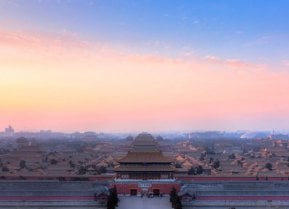The Trick to Challenging China in the Post-Trump Era
Unlike the Trump administration’s evangelical foreign policy driven by nativism, the Biden administration needs a government-wide alignment in action to revitalize the position of American strength with a concerted effort “to engage with the world.”
Aside from the prevailing consciousness of national humiliation, the coercive power of the Chinese market over the United States and the West cannot be overstated. It is worth considering the case of the movie “Top Gun: Maverick” which extolls the power of the U.S. Navy. In making the movie, Tencent—a Chinese tech giant and its American partner Paramount Pictures—replaced the Japanese and Taiwanese flags that originally appeared on Tom Cruise’s flight jacket with two other ambiguous symbols to appease China. The message suggests that while the American Navy is powerful, its power must be approved by Beijing.
Another classic case study comes from the Houston Rockets basketball team when its general manager, Daryl Morey, posted an image on Twitter in 2019 with the caption “Fight For Freedom. Stand with Hong Kong” in support of Hong Kong protesters. National Basketball Association (NBA) games draw millions of viewers in China. When Chinese broadcasters and streaming services responded by terminating the broadcast rights of Rockets games, not only did the NBA and the Rockets distance themselves from the general manager’s tweet, but Morey himself had to offer an apology.
Welcome to Realpolitik of China
For all the unforced errors made over the past four years, one policy decision that has likely proven correct was Trump’s realpolitik with China. But its eventual success will depend heavily upon the trans-Atlantic alliance and the Asian partnership being revitalized with renewed vigor to present a united approach to China. Beijing no doubt will be looking for schisms, however small. The Biden White House and American allies and partners must ensure there are none.
It is hard to predict just how many American values will be sacrificed in doing business with China, but one thing must be made clear, this tolerance is not infinitely elastic as Biden articulated in his Foreign Affairs article. Certainly, the Biden White House is not completely departing from the Trump administration’s policies and congressional acts, rather reinforcing them with America’s enduring democratic values.
Much is still to be deliberated and worked out in the Biden White House’s National Security Strategy. Unlike the Trump administration’s evangelical foreign policy driven by nativism, the Biden administration needs a government-wide alignment in action to revitalize the position of American strength with a concerted effort “to engage with the world.” In that sense, Biden is correct to say, “America is back. Diplomacy is back. Alliances are back. But we are not looking back.”
In retrospect, the American experience of moralpolitik is living up to its founding convictions of freedom, equality, and liberty from one “inflection point” to another. By welcoming the “position of strength” embedded in the enduring advantages of American education, democracy and diversity, the United States is destined to overcome the strategic rivalry, or a threat posed by China, Russia, or any other country.
Dr. Patrick Mendis, a former American diplomat and a military professor, is a distinguished visiting professor of culture and diplomacy at the Chinese Culture University and a former Taiwan fellow of the Ministry of Foreign Affairs and a non-resident senior fellow of the Taiwan Center for Security Studies in Taipei.
Joey Wang, a graduate of the U.S. National Defense University and the U.S. Naval War College, is a defense analyst in Washington, D.C. Both are alumni of the Kennedy School of Government at Harvard University. The views expressed in this analysis neither represent the official positions of the current or past institutional affiliations nor the respective governments.
Image: Reuters


